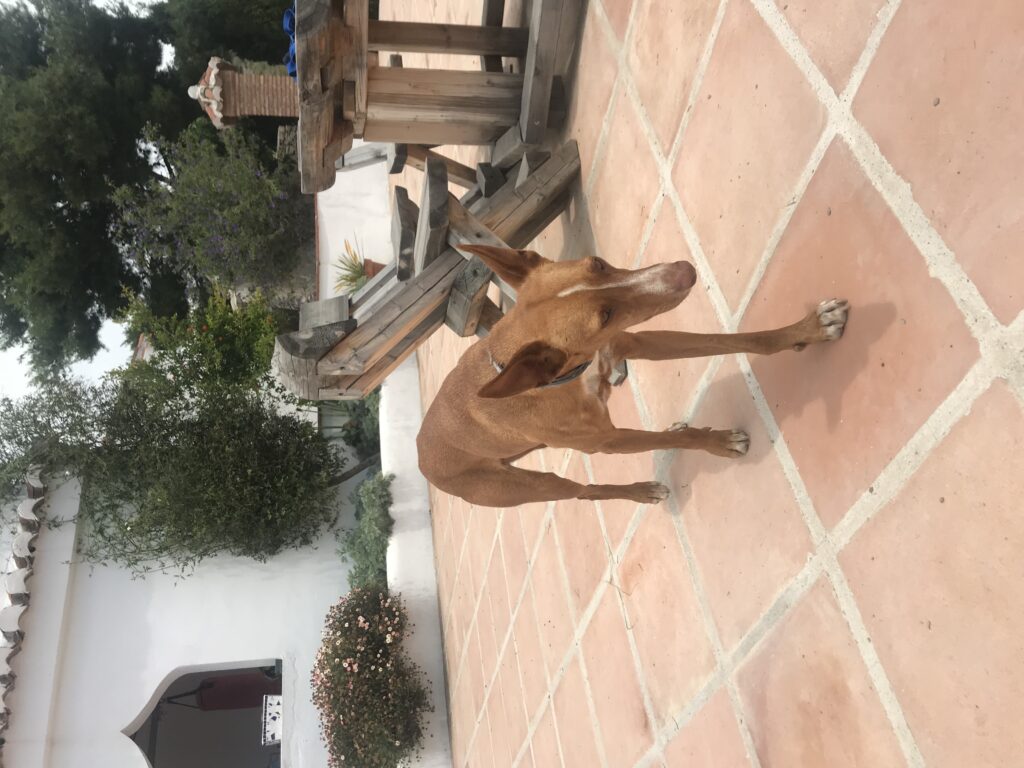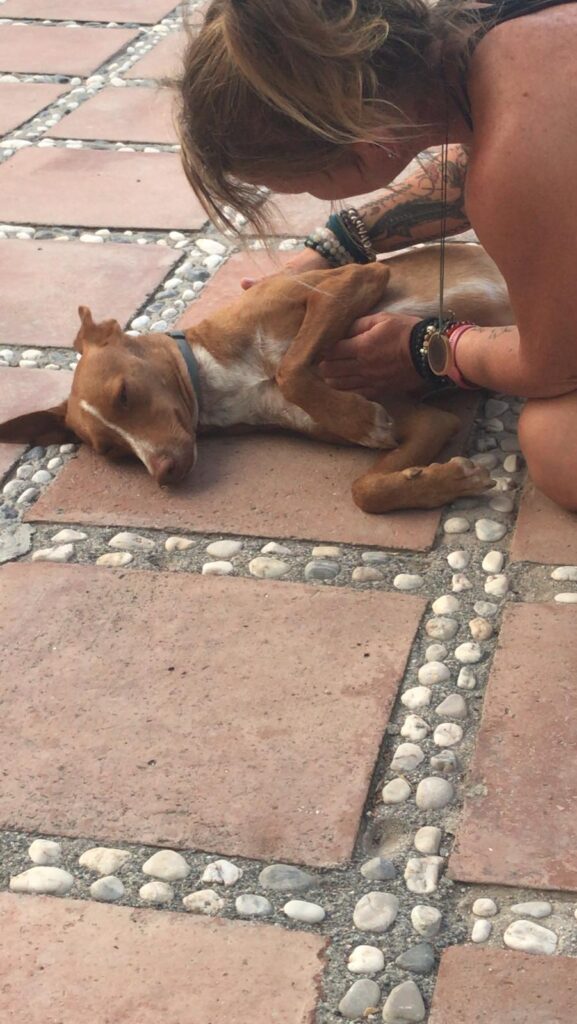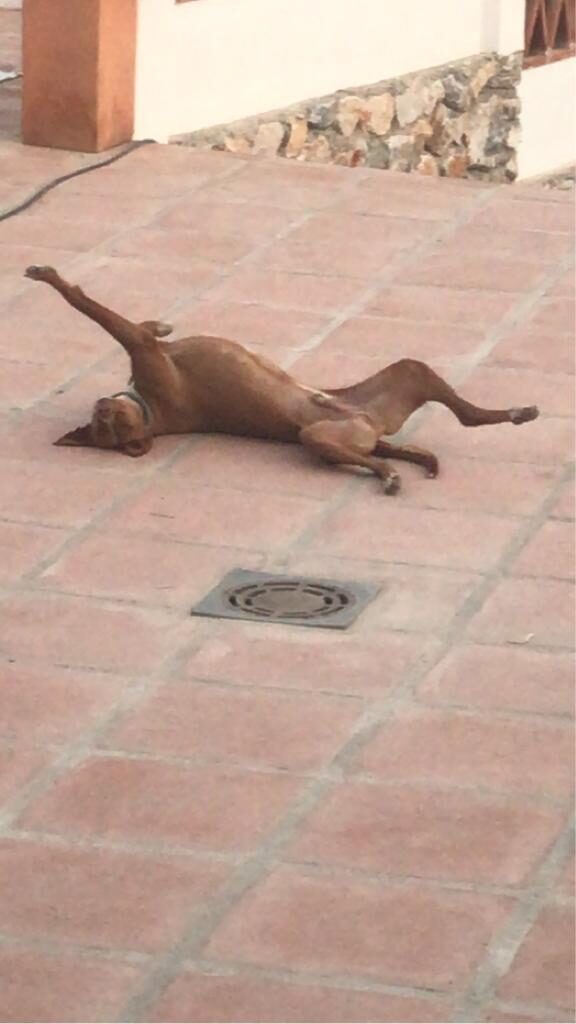The plane was about a third of the way from Lanzarote to Tenerife when Vance “Goose” Gusecki glanced out the window and noticed the propeller not turning.
“Umm,” he grunted, looking about.
The stewardess was busy serving coffee and Vance did not want to be impolite.
When she finished, Vance opened his mouth and raised a finger, but the woman returned to the back of the plane for more sugar. He gave a frustrated nod, and leaned into the window to see if there were other “safety” propellers on the wing still turning. There were not.
Once again Vance turned and found the stewardess. He hailed her.
“Good afternoon, sir,” she spoke with a brilliant-toothed smile glued to her mouth. Her name tag read ‘Gail.’ “How can I help you?”
“I don’t mean to be a bother,” Vance said, almost in a whisper, “but the propeller outside has stopped turning.”
“Which propeller?” asked Gail, mutating into concerned mode.
“On the wing,” Vance answered, pointing.
“Our wing?”
“Y-es, of course. Which…?”
“Oh, you must the prankster among us!” Gail chuckled heartily. “You had me going there! Good one!”
She shook her head and moved forward, still chuckling.
“But…” Vance protested.
“Did I hear you right, buddy?” asked the passenger behind him, a somewhat older man with a Hawaiian shirt. “Did you say the professor outside stopped turning? I don’t see anyone out there…”
“No, the propeller,” explained Vance. “Right there, see?” He tapped on the window.
“‘Propeller?’” the man asked. “This plane doesn’t have propellers. They are soo last millennium…”
“Yes we…just look out your window!”
Again he tapped on the window, staring at the propeller which refused to turn, but the airplane part surprised him. It fell off. The plane hitched noticeably, then flew steadily somehow. Vance’s tapping finger hung in the air.
“I only see the wing,” the man behind him said, straining. “As I should. Planes run on rocket fuel or something now, which is how they fly. Get with the program.”
The man’s voice shook him from his mini-state of petrification.
“This plane most certainly does not fly on rocket fuel,” argued Vance. “It’s too expensive for short flights like this one.”
“Are you saying I’m too stupid to know what a wing is?” his fellow passenger growled.
“Leave him, Jerry,” the woman next to him spoke. “He’s had too much to drink.”
“Wha..?” Vance gawked. “I don’t drink.”
“Sure you don’t!” she said, snorting. She sipped on her Rebujito while rolling her eyes.
“Are you bothering my companion?” Jerry called loudly.
Vance opened his mouth to say something, but the engines (engine?) began raising their voices. Again he froze, and his face paled.
The captain’s voice belted out over the intercom, droning something about altitude, air temperature, traveling speed, humidity, estimated time of arrival, drag coefficients, the wonderful items for sale in the onboard, duty-free shopping catalogue, the pilots’ names and favorite fútbol teams, etc., but Vance understood nothing. The engines (engine?) were too loud.
He picked up something about a fiesta, though.
Gail and the other stewardess emerged from the back of the plane in bright pink flamenco dresses with carnations in their hair. They pushed a serving cart with churros, roscón de reyes, fried milk, crepes, and cured sausage, which went well with the sweet stuff. Fireworks went off, and Vance almost wet himself.
What’s wrong with these people? he thought.
Someone trumpeted a paper party horn in his ear, and Vance turned to see the woman behind him winking his way. Which was his cue to remember his own companion, his wife, who had been in the bathroom for a really long time.
Gail shimmied through the aisles with a tequila bottle in one hand and shot glasses in the other. Ties were loosened. Women got frisky. Vance gaped.
Then the plane hit turbulence, slamming down on a pocket of air. The passengers stumbled and fell, and those remaining upright were stricken by the accompanying crashing noise, as if the plane had crash-landed on the ocean. There was a pause in the festivities.
“Whooooooooooo!!” one young man howled. “If that ain’t worth a toast I don’t know what is!”
“Stop!!!” Vance shouted, and once more the partygoers went quiet. “This plane is going down! I just watched the propeller fall off!”
As his eyes scanned the passengers from the front of the plane to the back, one of the bathroom doors opened, and his wife Faith came out, giggling with a younger man.
“Shut up Chas!” she tittered playfully, wiping something from the corner of her mouth. She noticed the silence. Looking up, she saw Vance staring at her. Her face went blank and she scampered to his side.
“What’s up, hon,” she asked, a little too enthusiastically. Her eyes widened and they searched his warmly.
“Well, hon,” Vance said. “I was just telling our fellow passengers here that the plane is going down. I saw the propeller stop and then fall off.”
“Man, you’re killing the vibe!” someone cursed.
“Cretino!” a Spanish passenger added.
At the back of the plane sat a handful of Guanches, the original people of the Canary Islands. Most were very tall, with handsome features, but all suffered from a form of poverty so abject it was unthinkable how they afforded the flight’s tickets.
As Vance and the partygoers stared each other down, some of these downtrodden people used the distraction to dip into nearby pocketbooks. One slipped into the back to see if anyone was watching the food supplies, for they were starving.
In the midst of the commotion, an older, white-haired gentleman named Bell made his way back from the front of the plane. He wore a Huge-O Boss suit and a truly immense hat. Vance could not stop staring at his mitre; the fact it did not scrape the ceiling at every twitch of the head below was a testament to the man’s dinkiness.
“What seems to be the trouble here?” Bell spoke. His voice was silvery and deep, like moonlight upon the waters on a lake in summertime. The sound made others instantly want to be his friend, or at least be taken notice of by him.
“That guy there keeps saying the plane is crashing!” said a middle-aged man wearing only a silk robe that had a dragon on it. He glared at the party pooper.
“I did,” said Vance, after a pause. He suddenly bubbled with anger. Losing faith does that. “And it’s time someone did something about it.”
“I detest the pastimes you people in low class engage yourselves with,” said the old man, who reminded Vance of Uncle Sam. “All your conspiracy theories are so…tedious. So, I dare ask: what makes you so sure this plane is going down?”
“I saw the propeller stop and then fall off,” said Vance calmly, with arms crossed.
“Maybe it’s supposed to do that,” the gentleman answered. “Are you an expert in planar science? Do you really understand how they work?”
“Yeah,” said the man who had accused him of killing the vibe. He wore an oversized pair of sunglasses and a helmet with holders for cups of beer that fed a straw he could drink from, should the need arise. “Maybe they fall off like the back parts of a rocket ya dimwit!”
Vance stood between two rows of seats and shook his head before sighing and looking down. When he raised his head again he stared out the window on the opposite side of the plane; specifically, at the propeller. It was not moving. The plane had gone eerily silent.
“Look!” he shouted, pointing with an open hand, “That one’s stopped too.”
Everyone turned in silence to look out towards the wing of the plane, where the propeller was preparing to fall off. With the wing.
Suddenly a large whooshing sound in the front of the plane was heard, and the passengers were forced to grab hold of either seats or each other. Vance saw the captain holding the door of the plane open. He stood there with a vintage leather bomber’s hat and goggles on, and also wore a parachute. The other passengers looked at each other and laughed like they were on a ride at the amusement park. After spotting Vance staring at him, the first officer touched the side of his nose, gave a wink, and leapt to his fate.
Vance watched Gail push the door closed again, and the large-sunglassed passenger used the ensuing pause to shout “PAAAAAAARRRRRTAAAAAYYYY!”
Everyone cheered except Vance and the older gentleman from the front, who stared back at him and mouthed the words “You’re on my list.”
“Why don’t you just try to relax?” Faith said soothingly, patting his head twice.
“Relax?” Vance gagged. “This plane is going down and my wife fooled around with a stranger in the bathroom!”
“You’re such a gloomy Gus!” Faith complained. “Maybe I didn’t fu…ool around with Chas. Maybe he just…um…massaged my neck! Yeah! You know how my tri-axle back plate acts up. And I’ll bet you’re imagining this whole plane thing too! Maybe the exploding propellers were just a prank!”
“They didn’t explode, they…”
“These planes are built by professional dwarves in a secret mountain way underground so they can never crash.”
At that moment, the plane nose-dove and Vance, who had been listening with his eyes focussed on his shoes, now leaned his head back and looked at the ceiling. The old swallowing-the-stomach feeling he remembered from roller coasters washed over him.
“Do you hear that noise?” he asked Faith, looking into her eyes. They both listened as the engines began to scream. “Those are the last sounds we’ll hear before we meet our maker. Our plane is in free fall.”
“Well I guess I don’t need to try perking you up anymore,” Faith uttered, getting up and storming to the front of the plane.
After a dreadful pause in which Vance drowned in the noise of the screaming engines, the older man from the front of the plane appeared, hatless, and headed directly towards Vance. His hair was unkempt and his fly unzipped, but his clapper hid.
Reaching his quarry, he let loose with a solid, tennis-trained backhander across the side of Vance’s head.
“This plane will never crash,” he said firmly. “It has always flown. It will always remain aloft. Any arguments to the contrary are heretical and must be stamped out as swiftly as they are spoken.”
His voice rose to a crescendo, drowning out the riotous din of the engines. Partygoers turned their heads. Even the Guanches stopped eating hopefully unimportant parts of the plane to observe the situation.
“This man is an infidel! A deceiver!” Bell shouted, pointing. “He leads the sheep astray! He endangers our sacred and momentous mission of spreading our lifestyle everywhere! I excommunicate him from our company! There is only one fate this man may expect, and that is at the stake!”
A cheer went up amongst the passengers, and, for want of a stake, the mob fell upon Vance and held him to his seat while he protested. They collected belts and strips of cloth, tying his limbs tightly where he sat. He donned a confused, piqued expression while the other passengers lay onboard shopping magazines and their paperback books at his feet.
When they had finished, the old man gave a nod, and one in their number struck a match.
Vance raised his gaze to the heavens.
“Do you have any final thoughts?”
“You may kill a weak goose,” Vance spoke in dramatic, “but far more powerful birds like eagles, falcons, and Rodan will come after me!”
The smoke from the fire got the passengers coughing, and their eyes did water. The scream of the engines was deafening. Faith dabbed her tears with a kerchief.





